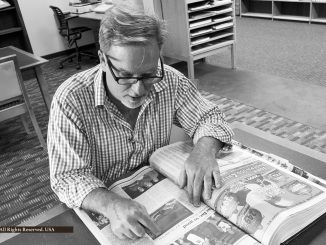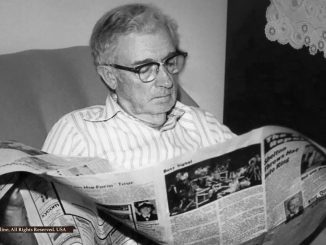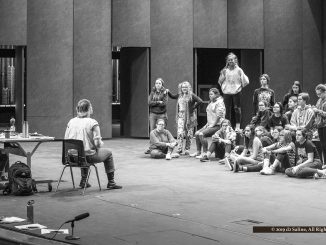
Yesterday looked to be one of the largest crowds for a monthly Ann Arbor / Ypsilanti Regional Chamber event of its type. An expert panel discussion on “the media” is increasingly important in the wake of Internet disruption, then growing critism of its own ethics post-2016 Presidential politics. [1-7]
But our Chamber approached this from an angle a lot closer to the ground yesterday morning with its Early Edition breakfast, “The Loss of Local Media: How to Remain Informed and Engaged.” [8]
For this audience, that title clearly evoked thoughts of The Ann Arbor News, closed little over a decade ago. In our home area, =The Saline Reporter, founded and for so many years published by the late Paul Tull. [9-11]
In its own setup materials here, the A2Y Chamber called out Pew Research Center findings that in 2018 found “US newspaper circulation reached its lowest level since 1940. [12]
Digital ad revenue has grown exponentially, but a majority goes to Facebook and Google rather than to publishers.
Taking the microphone early here, Lynette Clemetson, Director of Wallace House, observed of Ann Arbor that it is, even today, “unusual to have a town that has this much intellectual capital that doesn’t have a community newspaper.” [13]
But why is local media important at all?
Barbara McQuade, former US Attorney for the Eastern District of Michigan by appointment of President Barack Obama, provided substantiation not just for its importance, but its importance at a national level. [14]
Local media, specifically, =The Detroit Free Press=, broke the Kwami Kilpatrick story. When the text messages between Christine Beatty and Kwami Kilpatrick were discovered, =The Detroit Free Press was interested in the lurid details. But our office thought, ‘If they’re texting about all that, maybe they’re texting about bribes, too.’
That was essential. You’re only going to find that sort of detail in smaller levels of reporting. Local reporting is where you find =irregularities= to alert you to the possibility of bigger stories.
We could be a watchdog because local media was a watchdog.
Now on the faculty of the University of Michigan Law School, Professor McQuade went on to point out that “local city council and school boards are more relevant” to most citizens’ lives.
In a small town, five thousand dollars can sway a whole election. Corruption can be bought very cheap.
Ms Clemtson then asserted then asserted that “public media have stepped in to fill the void” left by declining number of print newspapers.
We’re seeing interesting collaborations between local and national news. For example, Frontline hired an all-Michigan team to report on the Flint water crisis. With that comes the knowledge of the local area.
Molly Motherwell, General Manager for Community NPR Station FM 89.1 WEMU, brought the issue full circle by emphasizing the need to distinguish between “journalism” and “information. [20,21]
Anyone can setup a news site. But many news sites are simply the opinion of the writer. Good journalism requires investment, resources. The cost of producing a solid piece of journalism go way beyond the one name in the byline. Journalism is more than a list of Tweets or a list of facts.
Like those in the private sector, the public sector interests reflected in this panel struggled with the question of making the work of professional journalism economically viable. The suggestion of taxpayer funded financing in support of such persuits, perhaps along the line of that advocatd for support of cultural arts.
Lynnette Clemetson expanded on the question by noting similar challenges faced by local libraries. “Both need saving,” she said. “Both continue to play a vital role that’s not being appreciated.
I don’t think we realize what we are doing by putting entire marketing investments into Facebook, what big platforms are doing to us. They do good things; I’m on Facebook. But we are giving a lot away without asking serious questions.
From her dedicated perspective within The University of Michigan arm committed to addressing “the challenges of journalism today” and fostering “civic engagement,” she remarked on trends among a growing number of local media outlets to turn off “Comment” features in support of forcing community gatherings for conversation. The notion that the virtually unbridled online feedback on news stories somehow compares with bygone “Letters to the Editor” in The Saline Reporter is specious.
“Every letter that came in was actually read,” Brian Cox told Saline Journal last weekend, recalling his time with The Saline Reporter. [22]
Reader’s letters were evaluated for relevance, for what they contributed to discussion of the topic. On Facebook, you’re lucky if a moderator catches something that blatantly violates community standards and get their page taken down. Calling yourself an editor doesn’t make you an editor.
By way of summarizing the A2Y Regional Chamber panel discussion, Ms Clmetson pointed to the ongoing state of flux in which media now operates. “There’s no clear path for any platform. No platform has come up with a proven model for readers or making income in the last twelve months.
So, ‘support of local media’ in this way or that is not clear. It’s not provable.
‘Short form’ writing is no longer considered proven, either. It used to be thought that you couldn’t write online like you did for a newspaper; people wouldn’t stick with it to read it.
But readers want longer articles as much as they ever have — if those stories are organized and thought-out and provide =something more.
References
- Ann Arbor / Ypsilanti Regional Chamber (home page).
- “A2Y Chamber Early Edition Breakfast” Ann Arbor / Ypsilanti Regional Chamber.
- “What effect has the internet had on journalism?” Aleks Krotoski (February 19, 2011) The Guardian.
- “The Future of Print: Newspapers Struggle to Survive in the Age of Technology” Tess Saperstein (December 6, 2014) Harvard Political Review.
- “Tech Is Changing the Way We Get Our News, and It’s Not Stopping” John Boitnott (July 22, 2015) Inc.
- “How Social Media Has Changed How We Consume News” Nicole Martin (November 30, 2018) Forbes.
- “The (almost) complete history of ‘fake news’” Mike Wendling (January 22, 2018) BBC.
- “A2Y Chamber Event: Early Edition – The Loss of Local Media: How to Remain Informed and Engaged” (September 18, 2019) Ann Arbor / Ypsilanti Regional Chamber.
- “After 174 years, The Ann Arbor News to close in July” Lindy Stevens (March 23, 2009) The Michigan Daily.
- “Saline Reporter” Central Michigan University: Digital Michigan Newspapers.
- “A news war that made waves on international scale” Tom Kirvan (January 31, 2014) Legal News.
- “5 key takeaways about the state of the news media in 2018” Michael Barthel (July 23, 2019) Pew Research Center.
- “Wallace House” University of Michigan.
- “McQuade, Barbara” Michigan Law, University of Michigan.
- “Detroit’s mayor indicted in sex scandal” Kevin Krolicki (March 24, 2008) Reuters.
- “Kwame Kilpatrick’s son to Trump: ‘Please grant my father mercy’” Emma Keith (August 15, 2019) Detroit Free Press.
- “US Attorney Barbara McQuade, ’91, to Join University of Michigan Law School” (March 14, 2017) Michigan Law, University of Michigan.
- “Frontline” PBS.
- “Flint’s Deadly Water” (September 10, 2019) PBS.
- “Welcome Special Guest Molly Motherwell on October 1” (September 30, 2015) Rotary Club of Ann Arbor North.
- WEMU 89.1 (home page).
- “Exclusive interview with Brian Cox, former journalist with ‘The Saline Reporter,’ on loss of local media: Part 1” Dell Deaton (September 16, 2019) Saline Journal.



